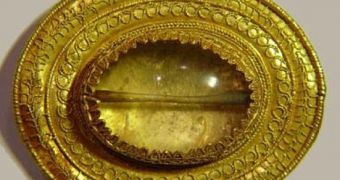Following its being the focus of several media reports because of a meteor that hit its Chelyabinsk region, Russia is now getting significant attention because of some very interesting archaeological finds.
Thus, the news has broken that a team of researchers investigating a necropolis hidden in the Caucasus have succeeded in unearthing a 2,000-year-old grave presumed to belong to an ancient warrior.
This particular piece of news might have gone unnoticed if it were not for the fact that, according to information made available to the public, said grave was not exactly empty at the moment of its being uncovered by archaeologists.
Quite the contrary: it is now being said that the tomb was home to several weapons and over a dozen gold artifacts.
More precisely, the archaeologists responsible for piecing together an inventory of the objects found maintain that, by the looks of it, this warrior was buried together with jewelry, two swords, two bronze helmets, an axe and several other similar items.
Furthermore, the grave was found to also contain the remains of three horses and a cow. Apparently, the skull of a wild boar was also resting in this location.
Given the fact that animals were greatly valued and appreciated in those times, the researchers who stumbled upon this tomb cannot help but assume that the warrior must have been greatly admired and appreciated by his contemporaries.
Daily Mail quotes Valentina Mordvintseva, a researcher currently working with the Ukrainian National Academy of Sciences Institute of Archaeology, who stated as follows:
“It [the presence of these animal remains] was a sign of [the] great importance of the buried person, which was shown by his relatives and his tribe.”
Interestingly enough, one of the swords found inside this grave was resting in between the warrior’s legs. As the researchers explain, the weapon was by no means accidentally placed there.
The grave was uncovered near the town of Mezmay in the Caucasus.

 14 DAY TRIAL //
14 DAY TRIAL //